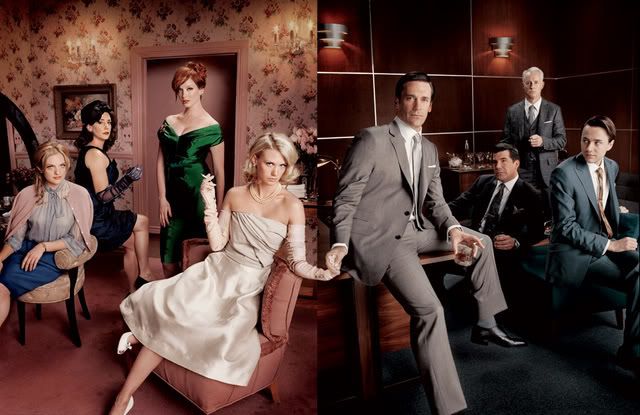Bumped from ten days ago – finally newsworthy
Inspired by ItStands’ diary on the dangers of entitlement (among the super rich), I thought it might be worth exploring the nuances of American self-help ethic from the other side of the Atlantic with the help of some eye candy…

This pic is not entirely gratuitous. Two issues in the news (and hot topics on the Moose) actually help to illuminate where self help ends and subsidy or support begins: the success of British Theatre and USTV drama.
The OPTIMISM of SELF HELP
But first my personal experience of the US.
When I first lived in the US in the early 80s as a high school student, I was staggered by this sense of “get up and go” about Americans compared to the UK in those days. In the 80s, we expected government to pay for schools, health, education, and even provide many of us with work. The sense of entitlement meant that many of us were subjects of a nanny state, and developed an unhealthy co-dependency on grants, subsidies and handouts.
The casual optimism and hope I found in the US, even in those grim days of the early 80s, was one of the most salient parts of my experience. I was at first a bit appalled, and then genuinely impressed by this American sense that our destiny is in our own hands, and we’re not waiting around for some hand to come down from on high and give us a lift. We can pull ourselves up by ourselves, with sufficient hard work and talent.
The EXAMPLE of US and UK TV DRAMA

Let me use TV drama as a case in point. For many years, the license fee subsidy of the BBC had created an environment in which diversity could thrive in British domestic output. Unlike the main networks of American TV, driven by advertising and Nielson ratings, British TV of the seventies through to the nineties had a reputation for experimentation and innovation, and we exported many of our best shows and formats from All in the Family (a US version of our Till Death Us Do Part) through Monty Python, to The Office. This is true not only of drama and comedy, but also documentaries, current affairs and (still true today both for good and ill) news coverage and reality TV.
But these days that export equation in TV drama has been reversed. While in my youth, USTV was usually associated with the mass market (e.g. Dallas and Dynasty) thanks to the rise of the cable channels, especially HBO, the opposite became true. Ask most informed Brits today what TV they count as ‘quality’ and they will cite American TV shows: The Sopranos, Sex in the City, The West Wing, Lost, The Shield, The Wire, Six Foot Under, or the current hit Mad Men.

(BTW – did you know that BOTH the male actors in this picture are British? Thought not)
There are complex reasons for the relative decline of UK TV drama which, since I’ve worked in it for years, would require a much longer essay, but the role of government in supporting the BBC is an overarching and crucial factor.
In the past individual producers in that organisation were given much more autonomy, but now it is run like a very centralised corporation, and one with no real competition at home. Effectively there are about two people who commission all the TV drama in the UK, and no matter how smart or bright they are, this crucial lack of diversity has led to a decline in quality and a thinning in output.
The opposite is true in the US. To get a commission in the maze like bureaucracy of UKTV is akin to the Pope being elected by a college of cardinals. Every time it’s happened to me, I have no idea quite why – but smoke emerged from the Vatican chimney.
In Hollywood by contrast, the pitching season is an open affair. In 2002, thanks to the support of a great producer (the late great lamented Anita Addison) I could walk into four network offices and make a simple ten minute pitch, and have my idea commissioned merely on its merits – though that Paul Haggis wanted to direct it must have helped. Given such a competitive environment, and a diverse array of channels, producers and broadcasters, there was an emphasis on great ideas that I had never experienced in the UK.
Ten or so years ago, Europeans would consistently complain about American TV that it was…
Hundreds of channels to choose from – but nothing to watch.
We are laughing on the other side of our faces now. Perversely, this competition has led to an amazing diversity of output, and amid this diversity many great dramas that have helped define the culture of the early 21st century.
A COUNTER EXAMPLE – London Theatre and Hollywood
However, no truth is completely unitary, and there are many examples where the American spirit of laissez faire can go awry as we all know. Left to themselves, and total self help, people will tend to help their own families, friends, or local tribes. In a sense, this is what’s happened to parts of Washington (under Bush of course but it began before) and to many of the modal monopolies of Wall Street.
Faced with concentration of power in the market, government can provide a crucial ‘trust busting/anti monopoly’ role and help mitigate the self reinforcing interests of cliques, classes and cabals. And it’s not just through legislation or regulation that government can bust monopolies, force open closed cartels: by providing a basic platform of accessible healthcare, education and training it can help people help themselves.
One such counter example is also in the cultural sphere: the success of British actors and directors in Hollywood.
Come Sunday Night, four of the films vying for a clutch of Oscars will be Danny Boyle’s Slumdog Millionaire, Stephen Daldry’s The Reader Sam Mendes’ Revolutionary Road and Frost Nixon, written by Peter Morgan.

I saw Frost Nixon in the tiny Donmar Warehouse (which used to be run by Sam Mendes) about two years ago. There were the same stars you see now in the movie – Frank Langella as Nixon, Michael Sheen as David Frost – and I find it amazing that the big budget Ron Howard film you can see in multiplexes across the world now was first incubated in a venue that seats less than two hundred people.
When it comes to directors, Daldry, Boyle and Mendes all spent most of their careers – like so many of the British actors you find in American films and TV shows – in our subsidized theatres. In fact Daldry and Boyle, now up against each other for Oscars, actually worked together in the famous Royal Court Theatre. Despite our failings in TV drama (and don’t even ask about our domestic film production!) Britain still has a remarkable edge in acting and directing talent, and some of that success derives from government subsidy to theatres (and to a certain extent radio drama where Slumdog Millionaire was first developed).

From a pure R&D perspective, the small amount of money the Arts Council actually spends on British theatre is a great investment. Like a University lab, this money funds experimentation, and develops skills, which in turn go on to pay themselves back in tourist tax revenues, not to mention the overseas earnings of UK talent. To me, this kind of subsidy, which helps people to help themselves, is a no brainer. Without it, the West End would consist almost completely of musicals (based on Old Po
p tunes). With it, even the commercial theatre in London thrives on the knock on reputation, and if it’s not on the streets of Beverly Hills, you’re most likely to meet a famous actor in the back alleys of Soho these days.
The LESSON of the ARTS
It would be easy to dismiss these two examples of cultural innovation as irrelevant to the wider problems that face Western Economies today. What on earth does The Sopranos have to do with industrial decline in New Jersey (beyond the obvious location)? And apart from appearing as a setting in the movie, what does Slumdog Millionaire have to do with the rise of phone call centre companies in places like India or Ireland?
There’s a lot of research that proves that the arts actually lead the way in innovations that the rest of the economy soon follows. And whether in cleantech or social networking software, it’s true that both the UK and the US have become increasingly knowledge economies, devoted to creative industries that innovate new ideas and intellectual processes, rather than the manufacture of objects and industrial equipment. Until the crash of recent ‘financial innovations’, the most successful parts of both economies revolved around this kind of creative capital: fresh thinking, experimentation in forms of communication and design – the same kind of attributes found in fringe arts and quality TV.
The question is then – in this time of crisis – where is competition thriving and where is it failing? Where does it produce diversity and quality? And where – either through excess of government help or lack of it – is monoculture, corruption and idiocy taking over…
Answers on the back of a postcard please. Or perhaps in some comments below
9 comments